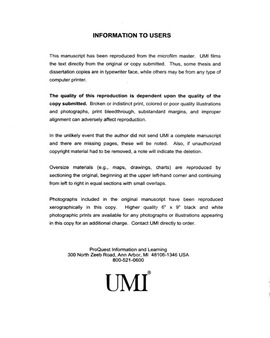| dc.contributor.advisor | Magrath, Jane, | en_US |
| dc.contributor.author | Pike, Pamela Dawn. | en_US |
| dc.date.accessioned | 2013-08-16T12:18:21Z | |
| dc.date.available | 2013-08-16T12:18:21Z | |
| dc.date.issued | 2001 | en_US |
| dc.identifier.uri | https://hdl.handle.net/11244/350 | |
| dc.description.abstract | The importance of the social and emotional benefits of leisure piano study, whether in a private or group setting, should not be underplayed. While all of the participants in this study experienced age-related difficulties while playing the piano, each had found ways to compensate for their problems. | en_US |
| dc.description.abstract | This phenomenological case study explored the experience of piano lessons from the perspective of 12 piano students over the age of 55. Six of the study participants were engaged in piano study through a continuing education program for senior citizens at a community college. The remaining six participants were taking private piano lessons from two teachers in the same geographic location. | en_US |
| dc.description.abstract | While the themes that emerged from this phenomenological study can not be generalized to all students over the age of 55 who study piano, the common trends noted for these participants suggest that there are certain goals, desires, and needs that many piano students may have when they study piano at a later stage in their lives. However, the participants in this study could not clearly articulate those goals or needs. This and other findings refute some of the adult learning theories that have long been accepted by educators. | en_US |
| dc.description.abstract | The population of North America over the age of 55 is expected to increase dramatically over the next decade. Life expectancy has also increased and North Americans are leaving the workforce earlier than they did just two decades ago. Thus, Americans find themselves retiring earlier and living longer and healthier lives. A trend toward pursuing learning throughout one's life, defined as lifelong learning, has also been noted. The pursuit of leisure activities upon departure from the professional arena is critical for maintaining health throughout the latter part of one's life. Musicians and piano pedagogues have begun to recognize the important role that engaging in musical activities at an older age can play in one's overall health. | en_US |
| dc.description.abstract | The findings of this study will sensitize teachers to the special needs and goals of their mature piano students and make educators more cognizant of creating a stimulating learning environment for their older piano students. | en_US |
| dc.description.abstract | The researcher conducted a series of in-depth interviews with each participant, video taped and observed piano lessons with each student, and conducted an interview with each of the teachers to triangulate the data. The researcher explored each case individually and then compared themes across the cases. | en_US |
| dc.format.extent | xi, 285 leaves : | en_US |
| dc.subject | Education, Adult and Continuing. | en_US |
| dc.subject | Music Social aspects. | en_US |
| dc.subject | Recreation. | en_US |
| dc.subject | Music Instruction and study. | en_US |
| dc.subject | Education, Music. | en_US |
| dc.subject | Music. | en_US |
| dc.subject | Gerontology. | en_US |
| dc.title | Leisure piano lessons: A case study of lifelong learning. | en_US |
| dc.type | Thesis | en_US |
| dc.thesis.degree | Ph.D. | en_US |
| dc.thesis.degreeDiscipline | School of Music | en_US |
| dc.note | Major Professor: Jane Magrath. | en_US |
| dc.note | Source: Dissertation Abstracts International, Volume: 62-06, Section: A, page: 2064. | en_US |
| ou.identifier | (UMI)AAI3018335 | en_US |
| ou.group | Weitzenhoffer Family College of Fine Arts::School of Music | |
